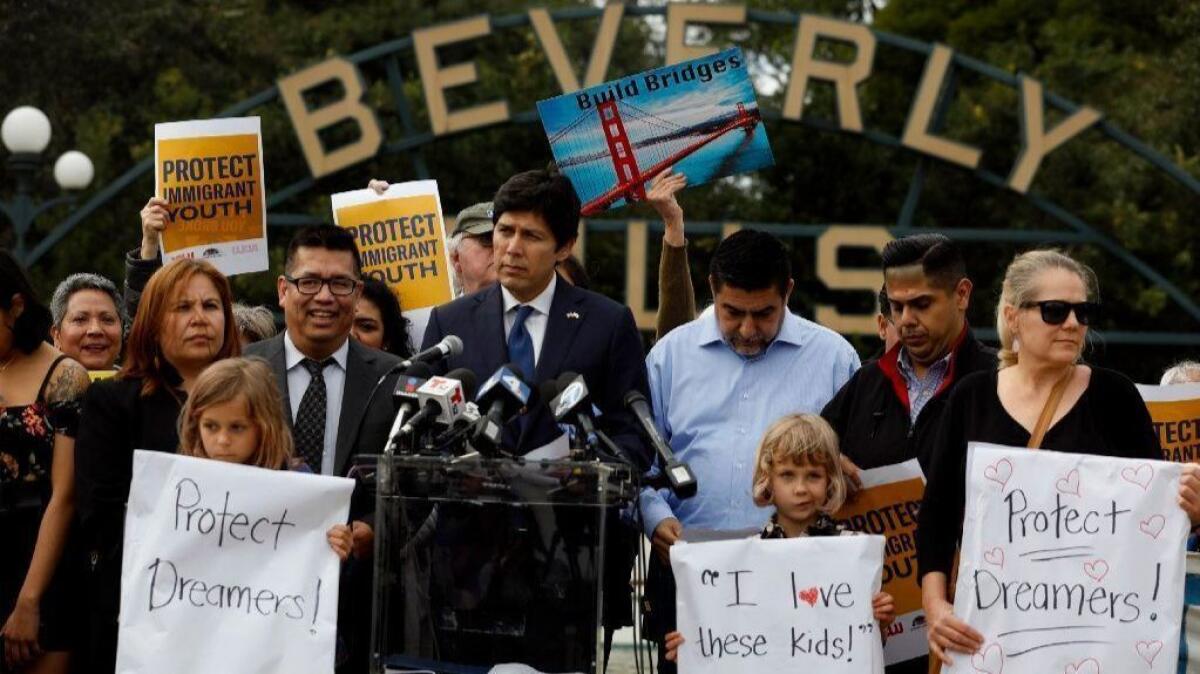Column: Kevin de León has proven energy, but Feinstein still has the clout

- Share via
Reporting from Sacramento — The best way to judge a job applicant is to look at his past work record. So let’s look at state Sen. Kevin de León’s.
The Los Angeles Democrat is challenging U.S. Sen. Dianne Feinstein, the grande dame of his party, trying to grab the coveted seat she has held for 26 years.
De León’s job performance as a legislator, including the last three-plus years as leader of the California Senate, indicates he’d be an energetic, in-your-face, ultimately effective U.S. senator — and much more liberal than Feinstein.
That doesn’t necessarily mean he should oust her. She has been very effective, one of the most influential Californians ever to hold the office. The main rap on Feinstein, brought up only with subtleties, is her age: 84. De León is 51.
That said, Feinstein shows no sign of slowing down. And her clout would be impossible to replace immediately.
There’s another rap voiced by De León: She’s a centrist in an era of polarized politics. She’s accused of being out of touch.
“The state has changed dramatically in the past quarter-century,” De León tells voters, “and it requires a new voice that expresses the values of California today, not yesterday.”
Feinstein is a moderate by nature and by practical necessity. To get anything done in Congress, she has needed to work closely with Republicans.
De León has benefited from overwhelming Democratic dominance since he was first elected to the Assembly in 2006. Four years later, he moved to the Senate and was elected president pro tem in late 2014. Now he faces term limits.
Like most people, De León is reflective of his background. He was raised by a single mother who immigrated to California illegally from Guatemala. He never knew his father, who was half-Guatemalan and half-Chinese.
De León’s mom, who ultimately became a legal resident, cleaned wealthy people’s houses in San Diego. He often tagged along on the bus with her to work. They and his two older half-sisters lived in a basement. The bathroom was up a flight of outside stairs.
He has acknowledged growing up with “a chip on my shoulder,” thinking “I wasn’t good enough, maybe.”
De León graduated from Pitzer College and became a labor organizer. In 1994, he helped organize a massive downtown L.A. march against Proposition 187, the ballot measure that sought to deny public services to undocumented immigrants. It passed overwhelmingly but was ruled unconstitutional.
With that background of illegal immigration and poverty, De León’s Sacramento agenda shouldn’t have been surprising — particularly his recent “sanctuary state” legislation. (He doesn’t call it that and detests the tag.)
His controversial bill, which the Trump administration is challenging in court, basically decrees to state and local law enforcement: Leave immigrants who are undocumented but otherwise law-abiding alone, but help federal agents kick out serious criminals. It says local cops should focus on enforcing local laws, and let federal agents enforce their own immigration laws.
Coverage of California politics »
De León also played a major role in passing a bill that allowed immigrants who are undocumented to obtain driver’s licenses.
And thinking of his 74-year-old aunt who cleaned houses with no retirement savings, De León got legislation passed to help people like her. Starting soon, it will allow low-income workers without employer retirement plans to join a modest state program financed by beneficiaries with virtually no employer or taxpayer cost.
De León has had a very broad legislative agenda.
Soon after he took office in 2007, a 9-year-old girl from Thailand was playing in her kitchen near where De León lived and was hit by a gang member’s stray bullet. She died. He got seriously into gun control, including background checks for ammunition buyers.
He has been a leader on climate change legislation, pushing hard for less fossil fuel use and more alternative energy. Where’d that come from?
“Poor people — working-class families — don’t have the financial wherewithal to be as resilient as those with economic means,” he told me. “I wanted to democratize the climate change benefits so everyone would have access to the latest clean energy technology.”
De León is like the Energizer Bunny — never stopping, always pushing major legislation, trying to form coalitions and negotiating.
Last year, he helped negotiate a gas tax increase to raise $5.2 billion annually for road repairs.
But he erred badly on a bill to create a state-run single-payer health insurance system. It carried an impossible $400-billion annual cost with no financing plan. It passed the Senate and was mercifully shelved in the Assembly. But it earned him the endorsement of the California Nurses Assn.
“You can criticize some of my stuff,” De León told me, “but you can’t say it wasn’t big and wasn’t bold. I’ve always been of the strong belief that the time period you have, you use it to the fullest.”
Polls indicate he doesn’t have much chance against Feinstein. For starters, he doesn’t have much campaign money. Last week, a survey by the Public Policy Institute of California showed Feinstein leading De León by 42% to 16%, with 39% undecided.
“Whoever thought that the youngest child of a single immigrant mother with a third-grade education would become the leader of the Senate?” De León responded. “The odds have always been against me. It’s the story of my life.”
The story of his legislating in Sacramento is that he’s no slouch.
Follow @LATimesSkelton on Twitter
More to Read
Get the L.A. Times Politics newsletter
Deeply reported insights into legislation, politics and policy from Sacramento, Washington and beyond. In your inbox twice per week.
You may occasionally receive promotional content from the Los Angeles Times.











